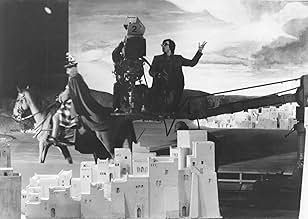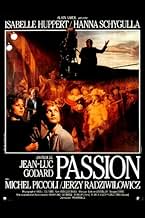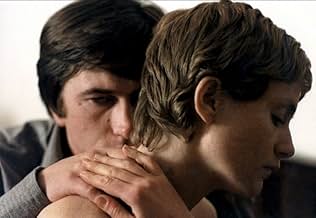VALUTAZIONE IMDb
6,2/10
3001
LA TUA VALUTAZIONE
Un regista polacco è in Svizzera per girare un film che riproduce le opere di famosi pittori. Mentre riflette sulla natura dell'arte e del suo lavoro è attratto da due donne, un'operaia e un... Leggi tuttoUn regista polacco è in Svizzera per girare un film che riproduce le opere di famosi pittori. Mentre riflette sulla natura dell'arte e del suo lavoro è attratto da due donne, un'operaia e una padrona d'albergo.Un regista polacco è in Svizzera per girare un film che riproduce le opere di famosi pittori. Mentre riflette sulla natura dell'arte e del suo lavoro è attratto da due donne, un'operaia e una padrona d'albergo.
- Regia
- Sceneggiatura
- Star
- Premi
- 1 vittoria e 5 candidature totali
Recensioni in evidenza
Passion was the kind of Jean-Luc Godard picture I would watch rather late at night, ironically enough, thinking of it and other works of his like digging into a good book as something fulfilling before conking out. There are things that make this effort quite reccomendable, albeit I'm not sure how I would react to it overall if seen again in the context of a sunny day and some more concentration going on. What remains striking, even when Godard was at his most slumming-it points in the 80s (and he had quite a few) are the images as done by a master of the camera. The opening shot is one of these, with the airplane far off in the sky letting out its white line of smoke, photographed to a classical composition playing in the background. It has a feel of the documentary, but the push of something more operatic in the meaning behind the image. This could go for what is most significant about the rest of the film, where- per usual as one of Godard's most love-hate subjects- cinema itself is dissected though what could be more like abstract documentary figures as characters.
The one asset to a film like Passion, at least in comparison to other works at this period for the filmmaker, is that there is at least something of a story going on, something that doesn't shut out a viewer entirely by the banality of overused semantics and images that end up evoking a disinterest in the distance of subject to viewer. There's even a couple of conversations one sees from time to time with the characters that go towards at least coherent and at best with a good edge at the struggles of film-making and the hassles of love, or half-hearted lust. The only problem then comes with some of this just being so experimental that it ends up closing off some viewers. I remember one segment that had the inklings of being a compelling scene, where Godard shows the filming within the filming (if it is that, maybe it isn't) of a period piece being filmed. There's many faces and narration going over each face and image, but one's attention (at least mine anyway) waxed and waned. This may or may not be Godard's fault; in fact, one of the points that Godard has in his main filmmaker character having to make a film on TV is how mixed forms of media can be sort of antithetical. But to say that there are more than a couple of scenes and moments that foreshadow Godard's decent into pure (un-captivating) self-indulgence in his later years is present, even amid the nudity and classical music.
The one asset to a film like Passion, at least in comparison to other works at this period for the filmmaker, is that there is at least something of a story going on, something that doesn't shut out a viewer entirely by the banality of overused semantics and images that end up evoking a disinterest in the distance of subject to viewer. There's even a couple of conversations one sees from time to time with the characters that go towards at least coherent and at best with a good edge at the struggles of film-making and the hassles of love, or half-hearted lust. The only problem then comes with some of this just being so experimental that it ends up closing off some viewers. I remember one segment that had the inklings of being a compelling scene, where Godard shows the filming within the filming (if it is that, maybe it isn't) of a period piece being filmed. There's many faces and narration going over each face and image, but one's attention (at least mine anyway) waxed and waned. This may or may not be Godard's fault; in fact, one of the points that Godard has in his main filmmaker character having to make a film on TV is how mixed forms of media can be sort of antithetical. But to say that there are more than a couple of scenes and moments that foreshadow Godard's decent into pure (un-captivating) self-indulgence in his later years is present, even amid the nudity and classical music.
Godard scholarship, lined along the axes of variants of French post-structuralism, would appear to have gotten it all wrong: a Godard movie can't be assimilated into a coherent and non-self-contradictory statement about work, gender, representation, or whatever academically approved topic you might name; it can't even be assimilated into a coherent process. What has to be confronted is that the work is essentially diaristic and subjective; these films are the more or less uncensored insides of Godard's head, not a white paper on a topic (no matter how "challenging" or "frustrating to expectations").
It also must be acknowledged that for Godard, even ideation is essentially sensuous, aestheticisable; ideas, like a piece of irruptive slapstick staging, a stale aphorism, a blast of the Mozart Requiem, are objects of delectation and desire, and finally repositories of aesthetic emotion--handwrapped presents. To say that the ideology of Godard's Maoist period was finally another aesthetic object for him is not to condescend to him as a radical-chicster. Very simply, Godard is an artist for whom the gland that produces aesthetic feeling works ten times more overtime than anyone else.
This produces the jarring and sometimes tonic feeling that we are overhearing the disordered and associative thoughts of God as He falls asleep. In a late, lyric work like HELAS POUR MOI, this quality becomes transcendent: the film is like a communication from a higher alien intelligence. In PASSION, that desire to aestheticize everything in sight, to wave a wand marked "excruciating beauty," in essence to make like a cinematic Goldfinger, is tripped up by the story Godard was required to tell in order to receive funding.
The necessity of telling a story is one of the (many) subjects that flit by in this production, which followed Godard's minorly popular comeback, EVERY MAN FOR HIMSELF. And the story Godard tells is so halfheartedly offered it disrupts the all-pervasive atmosphere of heightened lyricism he generates elsewhere. In essence, it's the same old movie about the making of a movie: the director (Jerzy Radzilowicz) is an idiot caught between a virginal proletarian (Isabelle Huppert!) and a slatternly hanger-on (Hanna Schygulla). The director pontificates, the producer (Michel Piccoli) avoids paying checks, and the inevitable phone calls for completion funds are delivered in dirty rooms.
If this reminds you of everything from BEWARE OF A HOLY WHORE to LIVING IN OBLIVION you're right; but nothing in those movies compared to Godard's strategy of contempt-uously making his stars Huppert and Piccoli stutter and cough, respectively. Or to the moment when a grip tells a child extra out of nowhere, "O those who will come after us--do not harden your hearts against us."
PASSION reminded me of John Simon's review of LE GAI SAVOIR, which began in the manner of, "I have seen no movie more illucid, arbitrary, and, yes, insane as..." PASSION genuinely is insane--it raises every line, every gesture, every landscape to a plane of unbearable intensity, and refuses to draw any lines between them. The cumulative effect suggests the personality of a slightly depressed but highly stimulated schizophrenic. Godard's late work is so beyond the prison of our narrative and identificational expectations that we may have to wait several lifetimes for its voice to be genuinely, not just indulgingly, heard.
It also must be acknowledged that for Godard, even ideation is essentially sensuous, aestheticisable; ideas, like a piece of irruptive slapstick staging, a stale aphorism, a blast of the Mozart Requiem, are objects of delectation and desire, and finally repositories of aesthetic emotion--handwrapped presents. To say that the ideology of Godard's Maoist period was finally another aesthetic object for him is not to condescend to him as a radical-chicster. Very simply, Godard is an artist for whom the gland that produces aesthetic feeling works ten times more overtime than anyone else.
This produces the jarring and sometimes tonic feeling that we are overhearing the disordered and associative thoughts of God as He falls asleep. In a late, lyric work like HELAS POUR MOI, this quality becomes transcendent: the film is like a communication from a higher alien intelligence. In PASSION, that desire to aestheticize everything in sight, to wave a wand marked "excruciating beauty," in essence to make like a cinematic Goldfinger, is tripped up by the story Godard was required to tell in order to receive funding.
The necessity of telling a story is one of the (many) subjects that flit by in this production, which followed Godard's minorly popular comeback, EVERY MAN FOR HIMSELF. And the story Godard tells is so halfheartedly offered it disrupts the all-pervasive atmosphere of heightened lyricism he generates elsewhere. In essence, it's the same old movie about the making of a movie: the director (Jerzy Radzilowicz) is an idiot caught between a virginal proletarian (Isabelle Huppert!) and a slatternly hanger-on (Hanna Schygulla). The director pontificates, the producer (Michel Piccoli) avoids paying checks, and the inevitable phone calls for completion funds are delivered in dirty rooms.
If this reminds you of everything from BEWARE OF A HOLY WHORE to LIVING IN OBLIVION you're right; but nothing in those movies compared to Godard's strategy of contempt-uously making his stars Huppert and Piccoli stutter and cough, respectively. Or to the moment when a grip tells a child extra out of nowhere, "O those who will come after us--do not harden your hearts against us."
PASSION reminded me of John Simon's review of LE GAI SAVOIR, which began in the manner of, "I have seen no movie more illucid, arbitrary, and, yes, insane as..." PASSION genuinely is insane--it raises every line, every gesture, every landscape to a plane of unbearable intensity, and refuses to draw any lines between them. The cumulative effect suggests the personality of a slightly depressed but highly stimulated schizophrenic. Godard's late work is so beyond the prison of our narrative and identificational expectations that we may have to wait several lifetimes for its voice to be genuinely, not just indulgingly, heard.
It's not that I don't like arty films, I just found this so dreary. i can see why it may be of interest to a film-student, but to sit through it for entertainment purposes is certainly not recommendable! If you suffer from lack of sleep, check this out and it'll have you snoozing within no time at all. A christmas present for a friend you want to get rid of. In other words - pretentious crap.
Despite the idiocy of the last comment there is an awful lot to be loved about Passion. The almost overstyled interiors of the studio set, complete with Painting Concrete (if you will) while the director and producer wander about discussing exactly how much per day it costs. Love it!
The narrative (yes it is there, just let your mind wander) is simple and familiar, the in jokes are hilarious, and the atmosphere, especially at the end scene with the ship in the forest is, at times, breath taking.
Yes it is dis-continuous, it is a film by JEAN-LUC GODARD! What do you expect. If you hate him, you'll hate this, if you love him, then this is destined to be one of your favourite JLG films (if you like his "mature" style that is).
The narrative (yes it is there, just let your mind wander) is simple and familiar, the in jokes are hilarious, and the atmosphere, especially at the end scene with the ship in the forest is, at times, breath taking.
Yes it is dis-continuous, it is a film by JEAN-LUC GODARD! What do you expect. If you hate him, you'll hate this, if you love him, then this is destined to be one of your favourite JLG films (if you like his "mature" style that is).
This is a good introduction to late-period Godard: all (ideological) passion spent, Oncle Jean is just going to show us a good time. Pretty girls lolling around the pool naked, glamourous stars like Hanna Schygulla with little to do, Isabelle Huppert when she could still play dewy-eyed ingenues, a ridiculous peplum being filmed by greedy, unscrupulous types (the director should have been played by Jacques Dutronc instead of that dour Polish actor).
It's 1982,these are the Thatcher-Reagan years, nobody thinks about Vietnam or the Palestinians or civil wars in Africa--people only want to make money. Godard gives us hip product-placement, Rembrandt, Caravaggio, Mozart instead of Coke or Pepsi.
It's 1982,these are the Thatcher-Reagan years, nobody thinks about Vietnam or the Palestinians or civil wars in Africa--people only want to make money. Godard gives us hip product-placement, Rembrandt, Caravaggio, Mozart instead of Coke or Pepsi.
Lo sapevi?
- QuizThe tableaux vivants filmed are: "The Night Watch" by Rembrandt; "The Parasol", "The Third of May 1808", "La Maja Desnuda" and "Charles IV of Spain and His Family" by Goya; "The Valpinçon Bather" and "The Turkish Bath" by Ingres; "Entry of the Crusaders in Constantinople" and "Jacob wrestling with the angel" by Eugène Delacroix; "Assumption of the Virgin" by El Greco; "The Embarkation for Cythera" by Watteau.
- ConnessioniEdited into Histoire(s) du cinéma: Une histoire seule (1989)
- Colonne sonoreFrères humains, L'amour n'a pas d'âge
Written by Léo Ferré
I più visti
Accedi per valutare e creare un elenco di titoli salvati per ottenere consigli personalizzati
- How long is Passion?Powered by Alexa
Dettagli
- Tempo di esecuzione1 ora 28 minuti
- Mix di suoni
- Proporzioni
- 1.66 : 1
Contribuisci a questa pagina
Suggerisci una modifica o aggiungi i contenuti mancanti




























